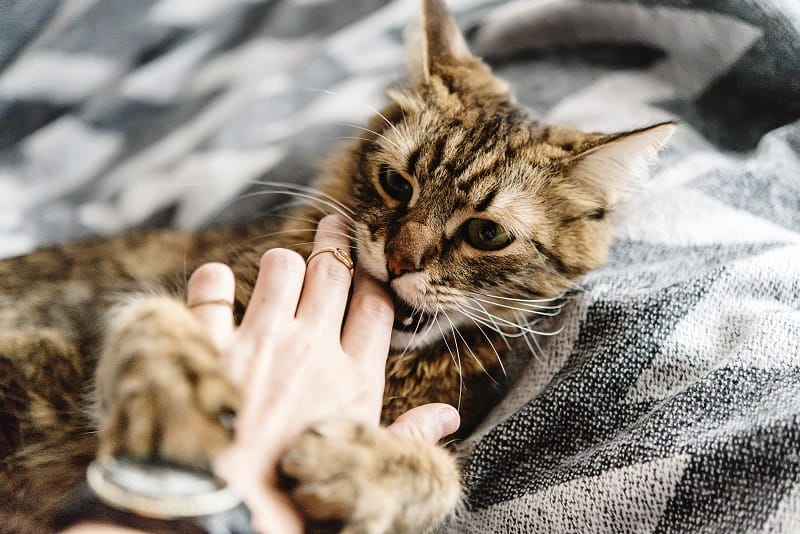
It could be due to fear or anxiety. A cat may also attack you due to an unpleasant odor or invading their territory. Some cats attack their owners when they want to play. They can also start showing aggression if you are wrongly petting the cat or spending too much time with them.
Being attacked by your cat without warning can seem alarming. Cats attack specific people for different reasons, and identifying the cause can help you figure out what to do next. We created this post to help you learn why a cat may only be attacking you and no one else. By the end of it, you will also learn how to prevent cat attacks.
Why a cat may be attacking you and no one else
Odors
A cat may be attacking you only and not anyone else since you smell different from other family members. Some odors scare cats or make them aggressive. Does your job entail working with animals? If yes, the cat can detect the smell of other animals on you when you get home. The cat may attack you out of fear.
Apart from the smell of other animals, a cat can also attack you if they smell a strong odor on you. If, for instance, your job entails handling products like cleaning agents such as bleach, perfumes, or paints, such odors can overwhelm the feline’s senses, making them aggressive. The smell of bleach is somehow similar to a cat’s urine and can make the cat overly excited.
The smell of a particular food on you can also lead to hostile behavior from the cat. For instance, most cats dislike the smell of citrus fruits like oranges. Some of the signs of fear-induced aggression that you should watch out for in a cat include scratching, growling or spitting. Since the cat may not have a way of letting you know that the scent is too much, they may result in attacking you.
You may be in their territory
Domesticated cats tend to protect their territory since they still have different wild instincts. Since cats are predators, any threat to the marked territory can lead to an attack. If you invade the cat’s space, they may attack you.
Sometimes, figuring out what the cat considers to be its territory may not be easy. It could be part of the house or the yard. Most cats that are not spayed tend to be territorial. Territorial aggression can also be directed at other animals that may invade their space.
The cat may want to play
As a cat owner, you should learn how to distinguish between aggression and playfulness. Sometimes, cats may seem to be attacking you when all they want is to play. A cat may assume that you like rough play and therefore end up being aggressive without bad intentions.
If your cat simply wants to play, some of the signs that may show include stalking or pouncing. The cat can also hide behind a chair and attack your ankles.
You are petting the cat wrongly
A cat may also attack you and no one else since they don’t like the way you pet them. If the cat has an old injury, it may be particular about how you pet it. If you pet such a cat wrongly, it may feel pain. If the cat is only attacking you, try to observe how other people in the family pet them to find out if you are doing it wrongly.
You may be spending too much time with the cat
Are you the one who takes care of the cat around the house? If yes, too much attention can make the cats start attacking you. If you groom the cat, feed them and spend too much time playing with them, you are likely to be a victim of their aggression. You can eliminate this form of attack by being more careful with how you manage interactions with the cat.
How to prevent a cat from attacking you
Eliminate the source of fear or stress in a cat |
A cat may be attacking you alone in the family since they are afraid or stressed. You should try to find out what may be causing such feelings to the feline and try to resolve it. |
Be patient with the cat |
Though cat bites can be painful, you should act rationally if the cat attacks you. Rather than punishing or yelling at the cat, you should try to be patient with the cat. If, for instance, the cat attacks you simply because they want your attention, walk away so that they can learn that this is not the right way to get it. |
Try play therapy |
This can help you manage minor aggression in a cat. If you rarely play with the cat, spare a few minutes every day to engage them more. You can even get the cat some interactive toys. |
Consult the vet |
If the situation gets out of hand and you have tried the above with no success, you can seek professional help. Take the cat to a vet for observation. The vet can confirm whether the cat has a medical condition that may be leading to aggressive behavior. |
Conclusion
Though cats are affectionate, they sometimes interpret normal tendencies as threatening and become aggressive. If a cat is attacking only you and no one else, you should find out why this happens and try to find a solution. Try implementing some of the tips we have shared above.
FAQs
What signs of aggression should I look out for in a cat?
Some of them include hissing and growling. If the cat steps forward and stares directly at you, it will likely attack.
What should I do if a cat keeps on attacking my ankles?
Rather than running away, you should stand your ground and push toward the cat. Stay still for some time and avoid paying any attention to the cat.


